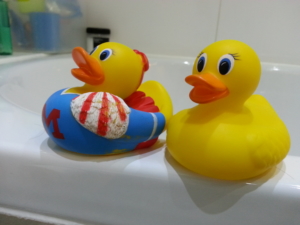Family Travel Fun with Words
I’m writing this post on the eve of our first official “field trip” here in London: On Friday the girls and I are joining Powerwoman and her students on an day-long educational excursion to the ancient city of Bath.
Personally, I’m excited to get a glimpse at history; the Romans established the city as a spa nearly 2,000 years ago, and it is now one of the best places in the world to see Georgian architecture.
The girls, of course, are stoked for another reason: They think we’re driving 2.5 hours to take a tubby.
No matter how many times their archaeologist mother attempts to explain the actual historical and cultural significance of Bath, L and R are convinced the place is a bath of a different kind. Earlier this week, they “packed” a bag full of tub toys. This afternoon, during lunch, L actually asked me if all of the buildings in Bath float. (Seriously. You can’t make this stuff up.)
The prelude got me thinking about how literal kids can be—a reality that is especially entertaining when you travel internationally and encounter a host of different words and/or expressions.
In nearly two months on the ground in London, my daughters have had a fair share of laughs about some kid-oriented British words and how they differ from stuff we might say back home. Some examples:
- “Nappy” is the British word for “diaper,” and R loves joking about how she needs a “new nappy for my nappy” every afternoon.
- “Mummy” is what most kids here say instead of “Mommy,” and L finds this hilarious because her “Mummy” studies mummies for a living. (Side note: The first time Powerwoman took us to the British Museum to see the ancient Egyptian mummies, L laughed for nearly an hour nonstop.)
- “Lift” is synonymous with “elevator” here, and whenever we ascend in one of these devices, L and R have a field day.
The girls also get a kick out of pretty much all three British words for “stroller”: buggy, pram and pushchair. “Buggy” receives the most play, mostly because some of their favorite toys since establishing roots here are, in fact, plastic bugs. (Without too much trouble, you can figure out the little-person humor here; jokes often revolve around the idea of taking a buggy in the buggy.)
The bottom line: You don’t need a Ph.D. to appreciate that linguistics is a HUGE part of the travel experience, and exploring it in amateur fashion is an easy way for you to expose your kids to the eccentricities of a new culture.
My advice? Don’t just point out differences to your little ones; engage them to think about why languages diverge, and challenge them to embrace new expressions and phrases as part of the travel experience. It might feel unnatural at first, but I guarantee you’ll be surprised/amused/entertained by the responses.
Remember, you don’t have to be a wordsmith (like me) to have fun with words.
How do you introduce your kids to linguistic differences when you travel abroad?


